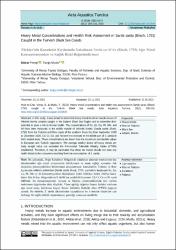| dc.contributor.author | Verep, Bülent | |
| dc.contributor.author | Mutlu, Tanju | |
| dc.date.accessioned | 2023-03-10T08:28:40Z | |
| dc.date.available | 2023-03-10T08:28:40Z | |
| dc.date.issued | 2022 | en_US |
| dc.identifier.citation | Verep, B. & Mutlu, T. (2022). Heavy Metal Concentrations and Health Risk Assessment in Sarda sarda (Bloch, 1793) Caught in the Turkish Black Sea Coasts. Acta Aquatica Turcica, 18(2), 208-216. https://doi.org/10.22392/actaquatr.1012944 | en_US |
| dc.identifier.issn | 2651-5474 | |
| dc.identifier.uri | https://doi.org/10.22392/actaquatr.1012944 | |
| dc.identifier.uri | https://hdl.handle.net/11436/7864 | |
| dc.description.abstract | In this study, it was aimed to determine heavy metal levels in muscle tissues of
Atlantic bonito samples caught in the Eastern Black Sea Region and to determine their
potential to pose a risk to human health. The concentrations of Fe, Zn, Cu, Pb, Mn, and
Al have been measured in the edible muscle of Atlantic bonito (Sarda sarda Bloch,
1793) from the Trabzon and Rize coasts of the southern Black Sea from September 2020
to December 2020. Cd, Cr, Co, and Ni were not detected in the edible part of S. sarda in
both coastal areas. These concentrations are lower than the maximum permissible values
in European and Turkish regulations. The average weekly intake of heavy metals per
body weight value not exceeded the Provisional Tolerable Weekly Intake (PTWI)
established. Therefore, it may be concluded that these ten metals should not pose any
health threat to the consumers resulting from the consumption of S. sarda. | en_US |
| dc.description.abstract | Bu çalışmada, Doğu Karadeniz Bölgesinde yakalanan palamut örneklerinin kas
dokularındaki ağır metal seviyelerinin belirlenmesi ve insan sağlığı açısından risk
oluşturma potansiyellerinin belirlenmesi amaçlanmıştır. Karadeniz'in Trabzon ve Rize
kıyılarında avlanan palamutun (Sarda sarda Bloch, 1793) yenilebilir kaslarında Fe, Zn,
Cu, Pb, Mn ve Al konsantrasyonları ölçülmüştür. Eylül 2020'den Aralık 2020'ye kadar
deniz. Her iki kıyı bölgesinde de S. sarda'nın yenilebilir kısmında Cd, Cr, Co ve Ni tespit
edilmedi. Bu konsantrasyonlar, Avrupa ve Türkiye yönetmeliklerinde izin verilen
maksimum değerlerden daha düşüktür. Vücut ağırlığı değerleri başına haftalık ortalama
ağır metal alımı, belirlenen Geçici Tolere Edilebilir Haftalık Alım (PTWI) değerini
aşmadı. Bu nedenle, S. sarda tüketiminden kaynaklanan bu 6 metalin tüketiciler için
herhangi bir sağlık tehdidi oluşturmaması gerektiği sonucuna varılabilir. | en_US |
| dc.language.iso | eng | en_US |
| dc.rights | info:eu-repo/semantics/openAccess | en_US |
| dc.subject | Heavy metals | en_US |
| dc.subject | Rize ve Trabzon | en_US |
| dc.subject | Black Sea | en_US |
| dc.subject | Atlantic Bonito | en_US |
| dc.subject | Ağır metaller | en_US |
| dc.subject | Karadeniz | en_US |
| dc.subject | Palamut | en_US |
| dc.title | Heavy metal concentrations and health risk assessment in sarda sarda (bloch, 1793) caught in the Turkish Black Sea coasts | en_US |
| dc.title.alternative | Türkiye'nin karadeniz kıyılarında yakalanan sarda sarda'da (bloch, 1793) ağır metal konsantrasyonları ve sağlık riski değerlendirmesi | en_US |
| dc.type | article | en_US |
| dc.contributor.department | RTEÜ, Su Ürünleri Fakültesi, Su Ürünleri Temel Bilimler Bölümü | en_US |
| dc.contributor.institutionauthor | Verep, Bülent | |
| dc.contributor.institutionauthor | Mutlu, Tanju | |
| dc.identifier.doi | 10.22392/actaquatr.1012944 | en_US |
| dc.identifier.volume | 18 | en_US |
| dc.identifier.issue | 2 | en_US |
| dc.identifier.startpage | 208 | en_US |
| dc.identifier.endpage | 216 | en_US |
| dc.relation.journal | Acta Aquatica Turcica | en_US |
| dc.relation.publicationcategory | Makale - Uluslararası Hakemli Dergi - Kurum Öğretim Elemanı | en_US |


















